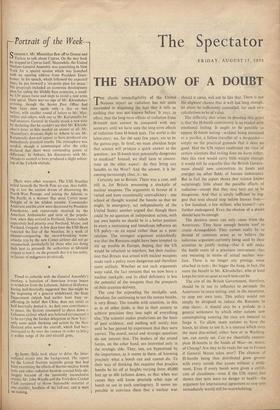THE SHADOW OF A DOUBT
Certainly not to Britain. There was a case, and still is, for Britain possessing a stockpile of nuclear weapons. The arguments in favour of it varied and were occasionally contradictory : one school of thought wanted the bombs so that we might, in emergency, act independently of the United States; another argued that though there could be no question of independent action, with our own bombs we should be in a better position to exert a restraining and beneficent influence on US policy—as an equal rather than as a poor relation. The strongest argument undoubtedly was that the,Russians might have been tempted to stir up trouble in Europe, hoping that the US would be reluctant to interfere; but their realisa- tion that Britain was armed with nuclear weapons made such a policy more dangerous and therefore more unlikely. Whether or not such arguments were valid, the fact remains that we now have a nuclear stockpile; and its chief deficiency is less the potential of the weapons than the prospects of their accurate delivery.
The case for expanding the stockpile, and, therefore, for continuing to test the newest bombs, is very flimsy. The trouble with scientists, in this as in all other fields, is that in their anxiety to achieve precision they lose sight of everything else. The scientist makes predictions on the basis of past evidence; and nothing will satisfy him until he has proved by experiment that they were correct. The moral, social and strategic questions do not interest him. The leaders of the armed forces, on the other hand, are interested only in the strategic side. They, too, are hypnotised by the importance, as it seems to them, of knowing precisely what a bomb can and cannot do. To their way of thinking this requires that practice bombs be let off at heights varying from 40,000 feet up to 400 fathoms down, so that when war comes they will know precisely what type of bomb to use in each contingency. It seems im- possible to convince them that a nuclear war, should it come, will not be like that. There is not the slightest chance that it will last long enough, let alone be sufficiently controlled, for such nice calculations to be of value.
The difficulty that arises in pressing this point is that the H-bomb controversy is so loaded with emotional feeling. It ought to be possible to oppose H-bomb testing---,without being disMissed as a pacifist, a fellow-traveller Or a do-gooder— simply on the practical grounds that it does no good. Had' the UN report confirmed the view of certain scientists that testing does no harm either, then this view would carry little weight (though it would still be arguable that the British Govern- ment .should now concentrate its funds and energies on other 'fields of huinan endeavour). But in fact the report shows that science knows surprisingly little about the posSible effects of radiation—except that they may turn out to be dangerous. And that is surely sufficient to sug- gest that tests should stop before human lives— a few hundred, a few million, who knows?:—are further endangered. EVen the shadow of a doubt should here be enough.
The decisive move can only come from the Americans. They have enough bombs nonr to create Armageddon. They cannot really be so devoid of common sense as to believe the ludicrous argunient currently being used by their scientists to justify testing—that it will make the bomb more of a precision instrument —has any meaning in terms. of actual nuclear war- fare. There is no longer any prestige value attached to tests : the bigger the bang, in fact, the more the benefit to Mr. Khrushchev, who at least keeps his tests as quiet as such tests can be.
The aim of the British Government, therefore. should be to use its influence to persuade the Americans to cease testing; and, in the meantime. to stop our own tests. This policy would not simply be designed to induce the Russians to stop theirs : it should also be a prelude to a general settlement by which other nations now contemplating entering the race are induced to forgo it. To allow more nations to have the bomb, let alone to test it, is a menace which even the most dim-witted, either here or in Washing- ton, can surely see. Can we cheerfully contem- plate H-bombs in the hands of Mao—or, worse. of Chiang? Are they to be ready for use in France if General Massu takes over? The chances of H-bombs being thus distributed grow greater with every month that passes without a settle- ment. Even if every bomb were given a certifi- cate of cleanliness—even if the UN report had shown that tests were no danger to health—the argument for international agreement to stop tests immediately would still be overwhelming.






























 Previous page
Previous page